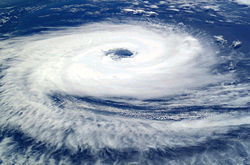Get the facts right. Determine the difference between these 3 terms and here’s the answer.
A hurricane is a tropical cyclone. Simply put:
Hurricane = Cyclone
What is a Hurricane = Cyclone
A tropical cyclone is a storm system characterized by a low pressure center and numerous thunderstorms that produce strong winds and flooding rain. A tropical cyclone feeds on heat released when moist air rises, resulting in condensation of water vapour contained in the moist air. They are fueled by a different heat mechanism than other cyclonic windstorms such as nor’easters, European windstorms, and polar lows, leading to their classification as “warm core” storm systems.

What is a tornado
A tornado is a violently rotating column of air which is in contact with both the surface of the earth and a cumulonimbus cloud or, in rare cases, the base of a cumulus cloud. Tornadoes come in many sizes but are typically in the form of a visible condensation funnel, whose narrow end touches the earth and is often encircled by a cloud of debris.

Differences Between Tornado and Cyclone
| Tornado | Cyclone | |
| Size | Has a diameter on the scale of hundreds of meters | Has a diameter on the scale of hundreds of kilometers |
| How are they formed | Produced from a single convective storm (i.e. a thunderstorm or cumulonimbus cloud) | Comprised of several to dozens of convective storms |
| Required Condition | require substantial vertical shear of the horizontal winds to provide ideal conditions for tornado genesis, and usua;;y happens in regions of large temperature gradient | Require very low values of tropospheric vertical shear in order to form and grow, and generated in regions of near zero horizontal temperature gradient |
| Appears on | Primarily an over-land phenomenon, as solar heating of the land surface usually contributes toward the development of the thunderstorm that spawns the vortex, although over-water tornadoes have occurred | Purely an oceanic phenomena. They die out over land due to a loss of a moisture source |
| Lifetime | Usually dies out in minutes | Can last for a few days |
Sarena B. says
This was very helpful! I was looking up the tornado of May 27, 1896 in Illinois and two sites said that it was not a tornado, but a cyclone. This site helped me understand the difference.
– Sarena Bee
ps. Thnaks!!
Jim F (The Tin Man) says
The important historical question then becomes this —
Was it a cyclone or a tornado that Dorothy and Toto experienced in Kansas way back when…..
Someone says
IT was a cyclone random person.
Yaisr says
Thanks a lot for the useful and informative article. I was really confused about the differences between tornadoes and cyclones.. but this was useful
aparna says
Thanks for this useful information about the differences between the tornado and cyclone .
this was very useful to me.thanks once again.
Affan says
nice explanation.
Fred says
Thanks David for the thorough description of the various differences, you site has concluded my search. Thanks again.
PS: it was a tornado from the above description, that Dorothy and Toto experienced in Kansas in answer to Jim ‘s question.
Paul says
Being in Australia, we get a quite a few Cyclones a year ranging from Northern Western Australia to far North Queensland.
From news coverage from the United States one gets the impression that Tornados are very destructive, so I have often wondered what is the difference between a Tornado or a Cyclone?
I’ll take a Tornado any day. Thank you for the information, your site and explanations are a lot more helpful than other sites I have visited for answers.
Super Anon says
Purely an oceanic phenomena. They die out over land due to a loss of a moisture source. Read the article. It was a tornado.
Will says
Paul from Australia. I’m not sure what you find so inviting about tornadoes. They kill hundreds every year and cause damage in the billions. Are you in construction or maybe a roofer eh?